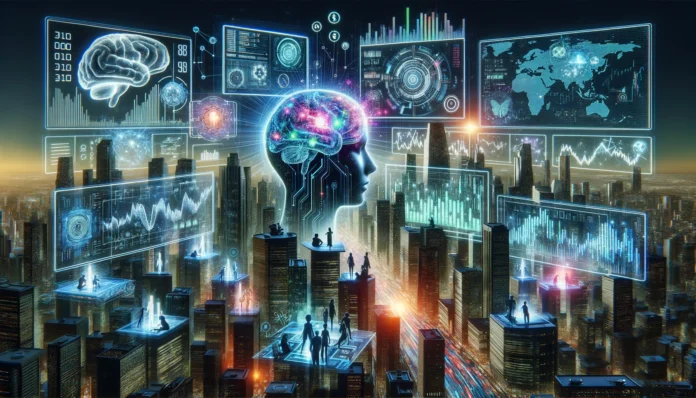Smart Finance: AI’s Disruptive Impact on Trading and Risk
The world of finance is in the midst of a revolution, one powered by the relentless march of technology. At the forefront of this revolution is Artificial Intelligence (AI), a disruptive force that is reshaping how trading is done and how risks are managed. In this article, we’ll delve into the transformative impact of AI on the financial landscape, exploring how it’s revolutionizing trading practices and redefining risk management strategies.
AI in Trading: A Game-Changer
Gone are the days of frantic trading floors bustling with human traders shouting orders. Today, algorithms powered by AI are executing trades at lightning speed, leveraging vast amounts of data to identify lucrative opportunities and execute trades with precision. These algorithms, often referred to as trading bots or robo-advisors, can analyze market trends, news sentiment, and historical data to make split-second decisions that human traders simply can’t match.
The rise of AI in trading has democratized access to financial markets, allowing retail investors to compete on a more level playing field with institutional giants. Platforms offering AI-driven trading algorithms have proliferated, enabling investors of all sizes to automate their investment strategies and potentially achieve higher returns with lower fees.
Risk Management Reinvented
In addition to revolutionizing trading practices, AI is also transforming the way risks are managed in the financial industry. Traditional risk management methods relied heavily on historical data and predefined models to assess and mitigate risks. However, these approaches often fell short in capturing the complexity and dynamism of today’s financial markets.
Enter AI-powered risk management solutions. By harnessing the power of machine learning algorithms, financial institutions can now analyze vast troves of data in real-time to identify emerging risks and adapt their strategies accordingly. These AI-driven risk management systems can detect anomalies, predict market movements, and assess portfolio vulnerabilities with unprecedented accuracy, empowering institutions to proactively manage risks and safeguard their investments.
Challenges and Opportunities
While the benefits of AI in finance are undeniable, its widespread adoption also presents a host of challenges and opportunities. One of the key challenges is the potential for algorithmic biases, where AI-driven models inadvertently perpetuate and amplify existing biases present in the data they’re trained on. Addressing these biases requires ongoing vigilance and the development of robust ethical frameworks to ensure that AI algorithms are fair, transparent, and accountable.
Moreover, the rapid pace of technological innovation in AI presents both opportunities and threats for market participants. Those who embrace AI-driven trading and risk management stand to gain a competitive edge in an increasingly crowded marketplace. However, failure to adapt to these technological advancements could leave traditional players at a disadvantage, relegating them to the sidelines as more agile competitors leverage AI to gain an edge.
Looking Ahead
As AI continues to evolve and mature, its impact on trading and risk management will only grow stronger. From automated trading algorithms to sophisticated risk analytics tools, AI is reshaping the financial landscape in profound ways, ushering in a new era of smart finance.
So, the disruptive impact of AI on trading and risk management cannot be overstated. By harnessing the power of machine learning and big data analytics, financial institutions can unlock new opportunities, mitigate risks, and stay ahead of the curve in an increasingly competitive marketplace. However, realizing the full potential of AI in finance requires careful consideration of ethical implications, proactive risk management strategies, and a willingness to embrace change. As we navigate this brave new world of smart finance, one thing is clear: the future belongs to those who dare to innovate and adapt.





